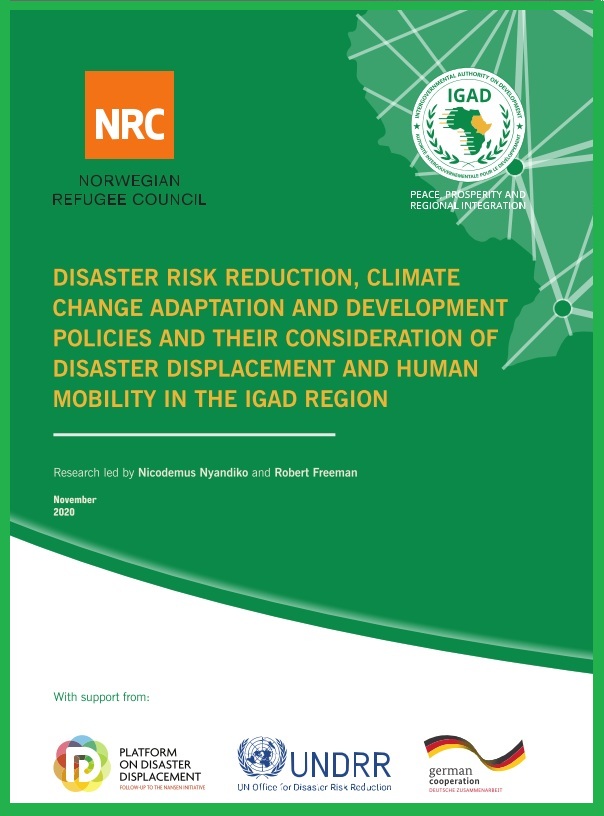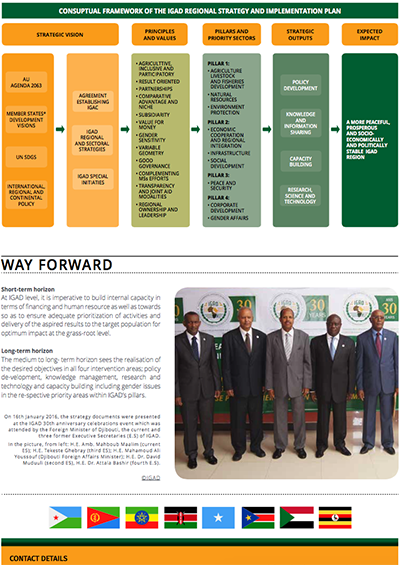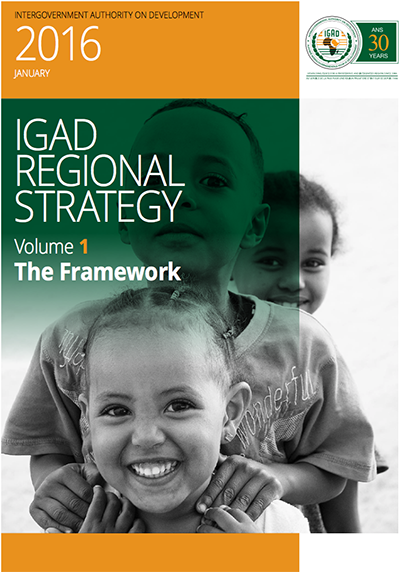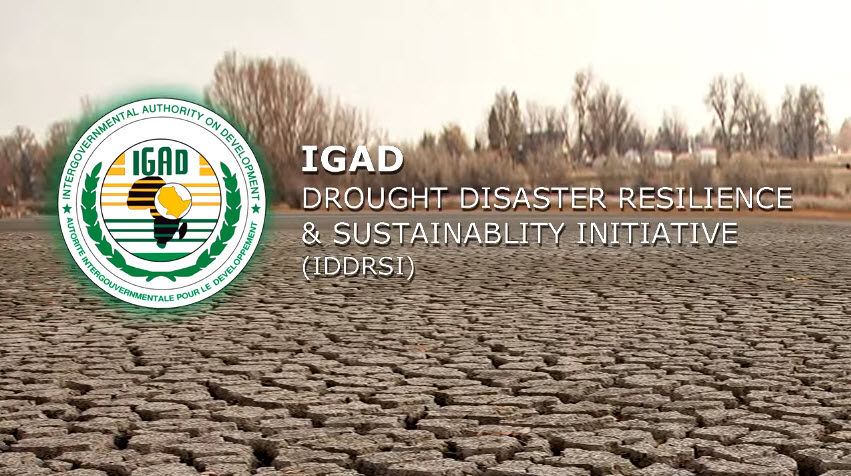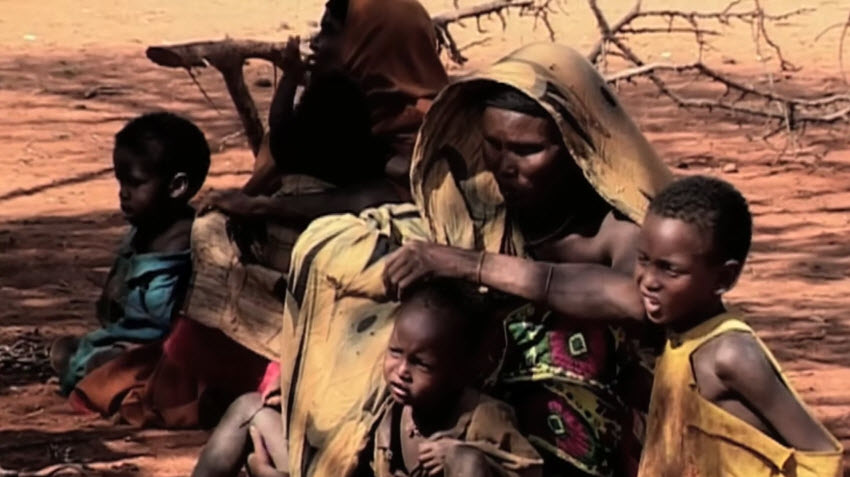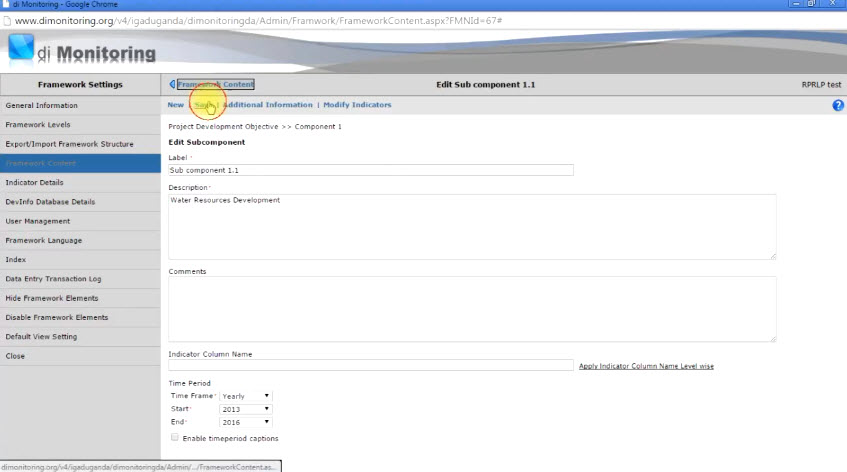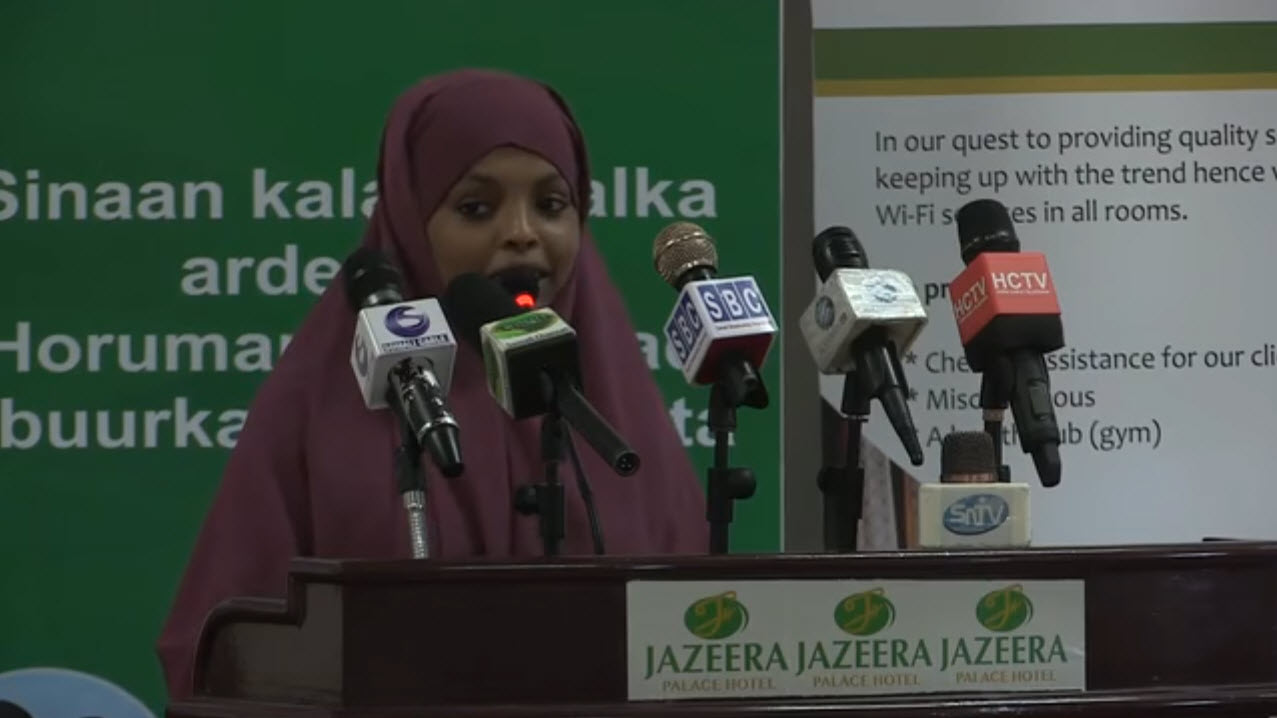INTRODUCTION
The purpose of this strategy, the “IGAD Regional Strategy and Implementation Plan 2016-2020”, is to provide a strategic and integrated framework for regional cooperation in the IGAD priority areas of intervention. The IGAD secretariat has facilitated the development of the Strategy as part of its core role. The Strategy is based on best knowledge at time of writing, as well as on previous and existing work, and has been developed in consultation member states, development partners and non-state actors. It is a whole-of-region and multi-stakeholder Strategy intended to provide a focus for regional cooperation and to improve integration and coordination of planning and activities, particularly between sectors and across geographical boundaries. The Strategy is intended to guide existing and forthcoming plans relevant to regional cooperation and to improve integration, and strategies that are region-wide in scope.
IGAD: its history and development
The Intergovernmental Authority on Development (IGAD) in Eastern Africa was created in 1996 to supersede the Intergovernmental Authority on Drought and Development (IGADD) which was founded in 1986 to mitigate the effects of the recurring severe droughts and other natural disasters that resulted in widespread famine, ecological degradation and economic hardship in the region. Djibouti, Ethiopia, Kenya, Somalia, Sudan and Uganda - took action through the United Nations to establish the intergovernmental body for development and drought control in their region. Eritrea became the seventh member after attaining independence in 1993 and in 2011 South Sudan joined IGAD as the eighth member state.
With the new emerging political and socio-economic challenges, the assembly of Heads of State and Government, meeting in Addis Ababa in April 1995, resolved to revitalize IGADD and expand areas of cooperation among Member States. The new and revitalized IGAD was launched during the 5th Summit of IGAD Assembly of Heads of State and Government held on 25-26 November 1996 in Djibouti. The Summit endorsed the decision to enhance regional cooperation in three priority areas of food security and environmental protection, economic cooperation, regional integration and social development peace and security.
IGAD Vision and Mission Statements
The founding leaders of IGAD were motivated by a vision where the people of the region would develop a regional identity, live in peace and enjoy a safe environment alleviating poverty through appropriate and effective sustainable development programmes. The IGAD Secretariat as the executive body of the Authority was given the mandate to achieve this goal.
Vision: IGAD to be the premier Regional Economic Community (REC) for achieving peace and sustainable development in the region.
Mission: Promote regional cooperation and integration to add value to Member States’ efforts in achieving peace, security and prosperity.
Aims and Objectives
As stipulated in Article 7 of the Agreement Establishing IGAD, the aims of IGAD include:
- Promote joint development strategies and gradually harmonize macro-economic policies and programmes in the social, technological and scientific fields;
- Harmonize policies with regard to trade, customs, transport, communications, agriculture, and natural resources and environment, and promote free movement of goods, services, and people within the region.
- Create an enabling environment for foreign, cross-border and domestic trade and investment;
- Initiate and promote programmes and projects to achieve regional food security and sustainable development of natural resources and environmental protection, and encourage and assist efforts of Member States to collectively combat drought and other natural and man-made disasters and their consequences;
- Develop and improve a coordinated and complementary infrastructure, in the areas of transport, telecommunications and energy in the region;
- Promote peace and stability in the region and create mechanisms within the region for the prevention, management and resolution of inter-State and intra-State conflicts through dialogue;
- Mobilize resources for the implementation of emergency, short-term, medium-term and long-term programmes within the framework of regional cooperation;
- Facilitate, promote and strengthen cooperation in research development and application in science and technology.
- Provide capacity building and training at regional and national levels; and
- Generate and disseminate development information in the region
Areas of Cooperation
The Agreement Establishing IGAD identifies some twenty areas of cooperation among the Member States. In addressing these diverse areas of cooperation in a manageable manner, the overarching IGAD Regional Strategy (2011-15) regrouped them under four Pillars as follows:
Pillar 1: Agriculture, Natural Resources and Environment;
Pillar 2: Economic Cooperation, Integration and Social Development;
Pillar 3: Peace and Security; and Humanitarian Affairs;
Pillar 4: Corporate Development Services
Hence, all IGAD programmes are clustered under these Pillars. The details of the programmes are provided in the specific sectoral and/or departmental strategies.
IGAD recognises the need for close and cooperative partnerships with all stakeholders in translating the ideals of the Strategy into concrete results. To that effect, IGAD has entred into partnerships with relevant actors at the local, national, regional and global levels who have similar mandates for achieving sustainable development in the region. Key IGAD partners include among others: the African Development Bank, the World Bank, the European Union (EU), Denmark, Finland, Norway, Sweden, Germany, Netherlands, Spain, Italy, Ireland, USAID, and Switzerland. Furthermore, IGAD enjoys close cooperation with the African Union (AU), RECs, UN-system agencies, and range of international, regional civil society organisations.
IGAD Structure
The Intergovernmental Authority on Development is comprised of four hierarchical policy organs as shown in the Figure 1 below:
- THE ASSEMBLY OF HEADS OF STATE AND GOVERNMENT is the supreme policy making and regulatory organ of the IGAD. It determines the objectives, guidelines and programmes for IGAD and meets once a year. A Chairman is elected from the Member States in rotation.
- THE COUNCIL OF MINISTERS is composed of the Ministers of Foreign Affairs and one other Focal Minister designated by each member state. The Council formulates policy, approves the work programme and annual budget of the Secretariat during its biannual sessions.
- THE COMMITTEE OF AMBASSADORS is comprised of IGAD Member States' Ambassadors or Plenipotentiaries accredited to the country of IGAD Headquarters. It convenes as often as the need arises to advise and guide the Executive Secretary.
- THE SECRETARIAT is headed by an Executive Secretary appointed by the Assembly of Heads of State and Government for a term of four years, renewable once. The Secretariat assists Member States in formulating regional projects in the priority areas, facilitates the coordination and harmonisation of development policies, mobilises resources to implement regional projects and programmes approved by the Council and reinforces national infrastructures necessary for implementing regional projects and policies.
The Executive Secretary is assisted by four Directors responsible for:
- Agriculture and Environment;
- Economic Cooperation and Social Development;
- Peace and Security; and
- Administration and Finance.
Besides the four Divisions and sections at the Headquarters in Djibouti, IGAD has a number of specialized institutions and Programmes hosted by other Member States. These include the IGAD Conflict Early Warning and Response Mechanism (CEWARN), the IGAD Security Sector Programme (ISSP), the IGAD Centre for Pastoral Area and Livestock Development (ICPALD) and IGAD Climate Prediction and Applications Center (ICPAC), and the IGAD Regional Aids Programme (IRAPP).
Comparative Advantage
IGAD is a Regional Economic Community (REC), one of the eight building blocs of the African Economic Community (AEC). The strategic location of the region, its size, ecological diversity, vast resources and people who are naturally integrated by culture and transboundary resources are among the main advantages that IGAD possesses. Furthermore, the IGAD region is host to a number of UN agencies and the AUC (in Addis Ababa and Nairobi), which allows for leveraged communications and faciliating meetings with the various Heads of State on high level policy issues and topics of common interest within the region.
The IGAD also enjoys the support of the individual Member States, as well as having formidable political clout through the high-level policy organs that are able to work collectively on tackling complex regional issues. Despite prevailing bilateral differences between some Member States, there is a positive commitment towards IGAD as the regional development institution. This is exemplified by the regular use of IGAD as a vehicle for addressing regional problems and concerns such as the Sudan and Somalia Peace Processes, regular participation of all countries in the meetings of the IGAD policy organs, financial contributions paid for the up-keep of the Secretariat and the establishment of political instruments such as IGAD Conflict Early Warning and Response Mechanism (CEWARN) the IGAD Security Sector Programme (ISSP), the IGAD Centre for Pastoral Area and Livestock Development (ICPALD) and IGAD Climate Prediction and Applications Center (ICPAC). This political will for regional cooperation is one of the strongest assets of IGAD, and has led to the IGAD Secretariat playing an increasingly important role in regional coordination and working towards developing a common position for the Member States in various regional and international fora, meetings, and conferences.
The programmatic approach adopted by the IGAD, another comparative advantage of the organization, creates the opportunity to connect individual programs and projects to a longer term vision and outcomes. The approach works on the premise that when diverse actors join their forces, the net effect will be bigger than the sum of the individual activities. Furthermore, a programmatic approach recognizes the importance of local ownership as a crucial and decisive element in creating a common vision and a strategy, setting the agenda and priorities, and establishing a plan of action. As a result, the IGAD has been able to create platforms and fora for engaging technical experts from the Member States to discuss issues concerning the environment, transport, gender affairs, health (HIV/AIDS), drought relience initiative (IDDRSI) and many regional technical committees; thus advancing the collective knowledge of the IGAD region. It has also created platforms where IGAD and its Development Partners discuss on regional priority interventions, mainstreaming of development partners’ programmes and projects into regional development frameworks, resources mobilisation and monitoring of the implementation of programmes and projects supported by Development Partners. The IGAD Partners Forum (IPF) at political and technical levels demonstrate additional strength of IGAD.
Capacity building initiatives such as the Institutional Strengthening Action Programme (ISAP) are another major strength of IGAD. These include identifying training needs, developing training concepts to address the needs, mobilising funds to organize, conduct and facilitate the whole range of IGAD activities including cross-cutting themes like information management, gender and mediation processes.

